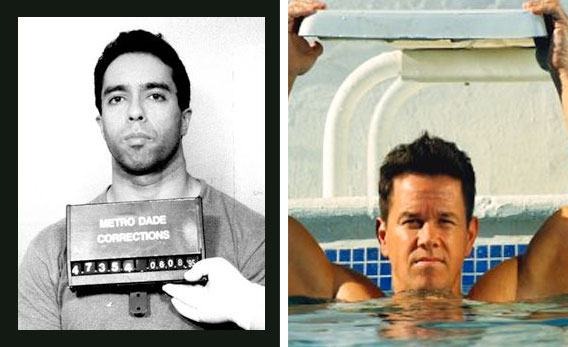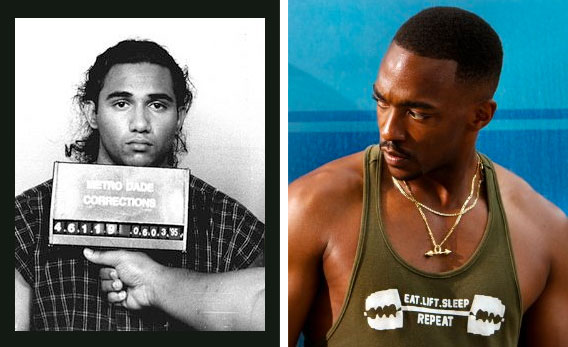Malik
Superstar
Pain & Gain true story? Fact and fiction in the new movie starring Mark Wahlberg. (PHOTOS)

The then 30-year-old from New York, played by Wahlberg, rose quickly up the management chain at Sun Gym, got the gang together—which, in real life, included several bit players—and spearheaded their violent schemes. His criminal activities were more various than the movie depicts: In addition to his prior fraud conviction, he was running a lucrative Medicare scam, in which he bought information about Medicare recipients and bilked the government for bogus medical services. Movie-Lugo appears to be single; the real Lugo was married—twice. Both his wife and his ex-wife played tangential roles in the gang’s crimes, as did Lugo’s girlfriend (about whom more below). Most notably, unlike Wahlberg’s character, the real Lugo was not stupid. He “was a smart-ass criminal,” according to the P.I. who helped take him down. “He wasn’t some brute street guy.” He did not, as far as I can tell, attend any self-help seminars, nor have I found instances in which he cited Rocky or Michael Corleone as role models. If he ever wore vanilla-scented cologne, Pete Collins doesn’t mention it. The victim of his first kidnapping recognized him by the sound of his voice.

Doorbal (Anthony Mackie), whose given first name was Noel, was a handsome bodybuilder whose steroid use had indeed rendered him impotent. He saw a doctor for hormone injections to fix that problem, but he did not meet his future wife, Cindy Eldridge (called Robin Peck in the movie), at those appointments. (She did recommend the doctor, though.) The need to fund those injections did not motivate Doorbal’s crimes; he was reportedly in good shape financially, because Lugo had given him a cut of profits from the Medicare scam. The movie depicts Doorbal as fairly timid, but, according the gang’s first target, “Doorbal just loved violence,” and seemed like “the kind of guy you’d imagine had fun killing cats and dogs as a kid.” It was Doorbal, not Lugo, who murdered Frank Griga, the gang’s second target. Doorbal and his wife did not have a whirlwind romance: She turned down his first proposal of marriage, and he began dating a stripper; later he and Cindy got back together and married at a courthouse. Cindy helped Doorbal clean up the blood in his townhouse after the Griga murder, though she apparently did not know exactly what had transpired at the time. As in the movie, she divorced Doorbal during the trial and testified against him.

The character played by Dwayne Johnson is a composite, based primarily on Carl Weekes, with shades of Jorge Delgado (bottom left in the photo above) and Mario Sanchez (top left). Weekes was a recovering addict and ex-con who’d found Jesus and moved to Miami to get help from a cousin who worked at Sun Gym. (He never went to work at a church; no elderly gay priest came onto him.) Both were roped into Lugo’s scheme, but they only helped out with the kidnapping of the gang’s first victim. They declined to participate in subsequent crimes. Weekes, like Doyle, was much kinder to that first victim than the other men. He was also quite small—unlike Mario Sanchez, a weightlifting instructor Lugo paid to serve as an intimidator during the first kidnapping, and who appears to be another inspiration for Doyle. In real life, the third key member of the gang was Jorge Delgado (about whom more below). Like Doyle in the movie, Delgado testified against Doorbal and Lugo and received a 15-year sentence. (Lugo and Doorbal got the death penalty.) Pain & Gain shows a mugshot of “Doyle” at the end of the movie; it’s not clear to us who that mugshot is. (It does not resemble the three men pictured above.)

Tony Shalhoub’s character is more superficially detestable than the man in the Collins articles who inspired him, Marc Schiller. Unlike the man we meet in those pieces, Kershaw is a scrawny slimeball who’s arrogant about his money. Kershaw drives a BMW with a license plate that says “Miami bytch,” while Schiller drove a Toyota 4Runner. Kershaw meets Lugo at the gym; Schiller never went. He was targeted first not by Lugo, but by a former employee and associate named Jorge Delgado, a Sun Gym member who had fallen under Lugo’s sway (one of the reasons Delgado and Schiller had a falling out). But Bay leaves out the real story’s final twist: After testifying against his assailants, Schiller was arrested by the FBI for organizing his own Medicare scam that siphoned off about $14 million. He pled guilty, and served 46 months in jail—though he now insists he was innocent, and just too exhausted to defend himself. (For what it’s worth, the judge from the Lugo case made the highly unusual gesture of testifying on Schiller’s behalf in that trial.) Schiller also believes he’s been unfairly depicted in the media before. As for Pain & Gain, “There is no resemblance to me at all,” he said, after watching the trailer. “I was always a humble, family person.” He has written a book about the ordeal.

The then 30-year-old from New York, played by Wahlberg, rose quickly up the management chain at Sun Gym, got the gang together—which, in real life, included several bit players—and spearheaded their violent schemes. His criminal activities were more various than the movie depicts: In addition to his prior fraud conviction, he was running a lucrative Medicare scam, in which he bought information about Medicare recipients and bilked the government for bogus medical services. Movie-Lugo appears to be single; the real Lugo was married—twice. Both his wife and his ex-wife played tangential roles in the gang’s crimes, as did Lugo’s girlfriend (about whom more below). Most notably, unlike Wahlberg’s character, the real Lugo was not stupid. He “was a smart-ass criminal,” according to the P.I. who helped take him down. “He wasn’t some brute street guy.” He did not, as far as I can tell, attend any self-help seminars, nor have I found instances in which he cited Rocky or Michael Corleone as role models. If he ever wore vanilla-scented cologne, Pete Collins doesn’t mention it. The victim of his first kidnapping recognized him by the sound of his voice.

Doorbal (Anthony Mackie), whose given first name was Noel, was a handsome bodybuilder whose steroid use had indeed rendered him impotent. He saw a doctor for hormone injections to fix that problem, but he did not meet his future wife, Cindy Eldridge (called Robin Peck in the movie), at those appointments. (She did recommend the doctor, though.) The need to fund those injections did not motivate Doorbal’s crimes; he was reportedly in good shape financially, because Lugo had given him a cut of profits from the Medicare scam. The movie depicts Doorbal as fairly timid, but, according the gang’s first target, “Doorbal just loved violence,” and seemed like “the kind of guy you’d imagine had fun killing cats and dogs as a kid.” It was Doorbal, not Lugo, who murdered Frank Griga, the gang’s second target. Doorbal and his wife did not have a whirlwind romance: She turned down his first proposal of marriage, and he began dating a stripper; later he and Cindy got back together and married at a courthouse. Cindy helped Doorbal clean up the blood in his townhouse after the Griga murder, though she apparently did not know exactly what had transpired at the time. As in the movie, she divorced Doorbal during the trial and testified against him.

The character played by Dwayne Johnson is a composite, based primarily on Carl Weekes, with shades of Jorge Delgado (bottom left in the photo above) and Mario Sanchez (top left). Weekes was a recovering addict and ex-con who’d found Jesus and moved to Miami to get help from a cousin who worked at Sun Gym. (He never went to work at a church; no elderly gay priest came onto him.) Both were roped into Lugo’s scheme, but they only helped out with the kidnapping of the gang’s first victim. They declined to participate in subsequent crimes. Weekes, like Doyle, was much kinder to that first victim than the other men. He was also quite small—unlike Mario Sanchez, a weightlifting instructor Lugo paid to serve as an intimidator during the first kidnapping, and who appears to be another inspiration for Doyle. In real life, the third key member of the gang was Jorge Delgado (about whom more below). Like Doyle in the movie, Delgado testified against Doorbal and Lugo and received a 15-year sentence. (Lugo and Doorbal got the death penalty.) Pain & Gain shows a mugshot of “Doyle” at the end of the movie; it’s not clear to us who that mugshot is. (It does not resemble the three men pictured above.)

Tony Shalhoub’s character is more superficially detestable than the man in the Collins articles who inspired him, Marc Schiller. Unlike the man we meet in those pieces, Kershaw is a scrawny slimeball who’s arrogant about his money. Kershaw drives a BMW with a license plate that says “Miami bytch,” while Schiller drove a Toyota 4Runner. Kershaw meets Lugo at the gym; Schiller never went. He was targeted first not by Lugo, but by a former employee and associate named Jorge Delgado, a Sun Gym member who had fallen under Lugo’s sway (one of the reasons Delgado and Schiller had a falling out). But Bay leaves out the real story’s final twist: After testifying against his assailants, Schiller was arrested by the FBI for organizing his own Medicare scam that siphoned off about $14 million. He pled guilty, and served 46 months in jail—though he now insists he was innocent, and just too exhausted to defend himself. (For what it’s worth, the judge from the Lugo case made the highly unusual gesture of testifying on Schiller’s behalf in that trial.) Schiller also believes he’s been unfairly depicted in the media before. As for Pain & Gain, “There is no resemblance to me at all,” he said, after watching the trailer. “I was always a humble, family person.” He has written a book about the ordeal.



